2024-2025学年人教版九年级英语全册Unit 8 It must belong to Carla. Section A 语法课 课件(22张PPT,内嵌音频)
文档属性
| 名称 | 2024-2025学年人教版九年级英语全册Unit 8 It must belong to Carla. Section A 语法课 课件(22张PPT,内嵌音频) |  | |
| 格式 | pptx | ||
| 文件大小 | 22.7MB | ||
| 资源类型 | 教案 | ||
| 版本资源 | 人教新目标(Go for it)版 | ||
| 科目 | 英语 | ||
| 更新时间 | 2024-11-21 08:50:17 | ||
图片预览

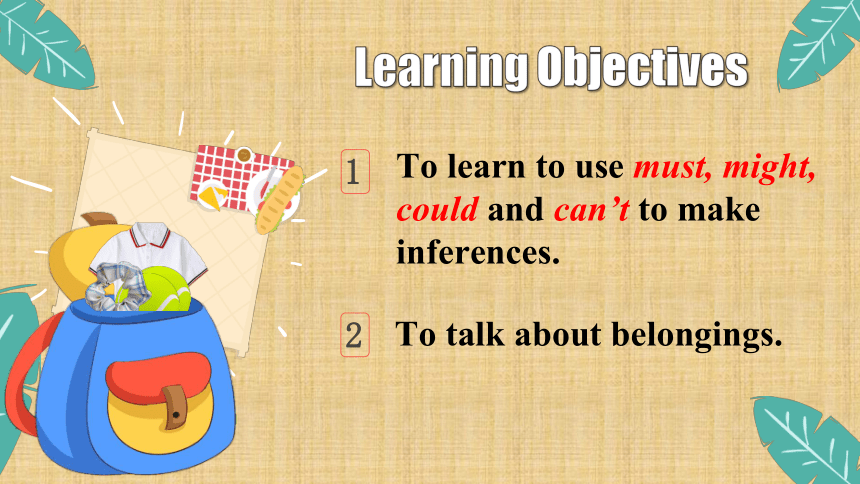
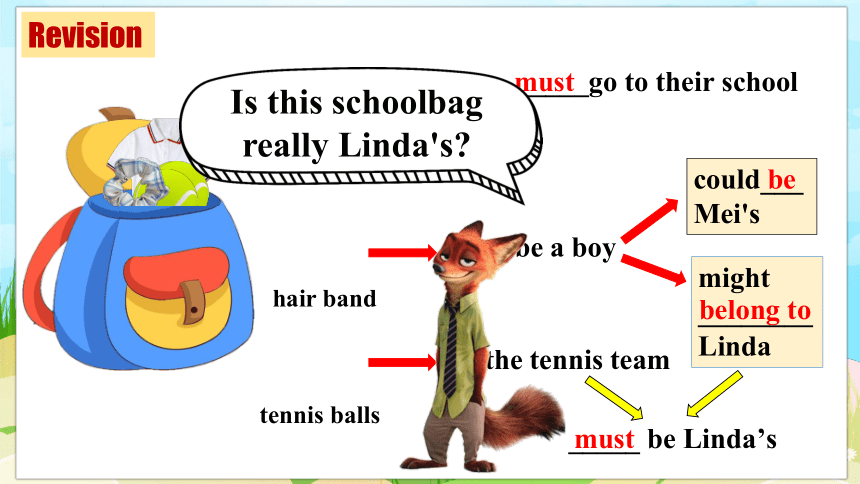

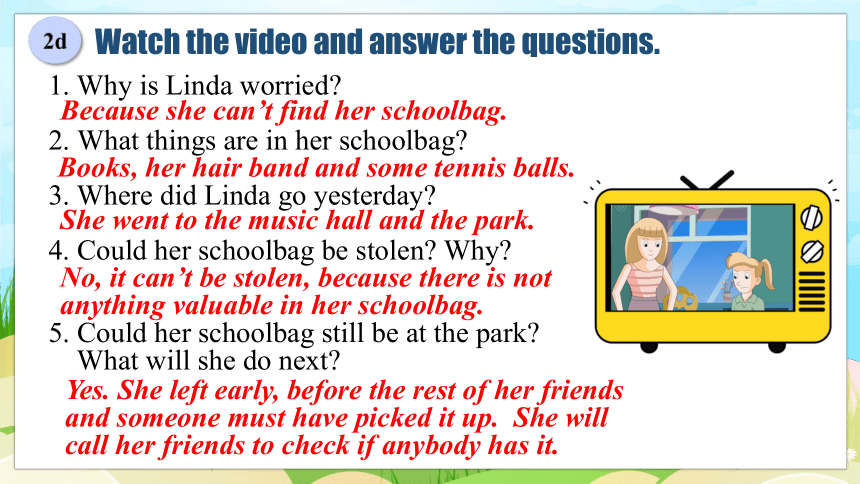
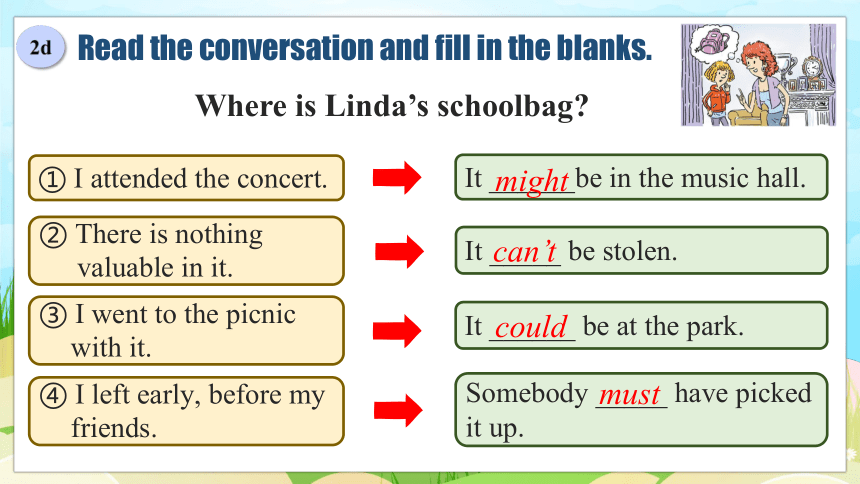
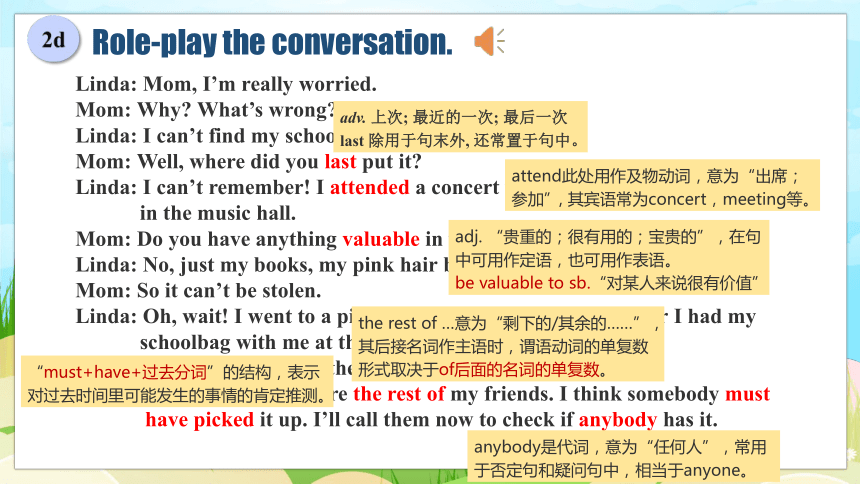
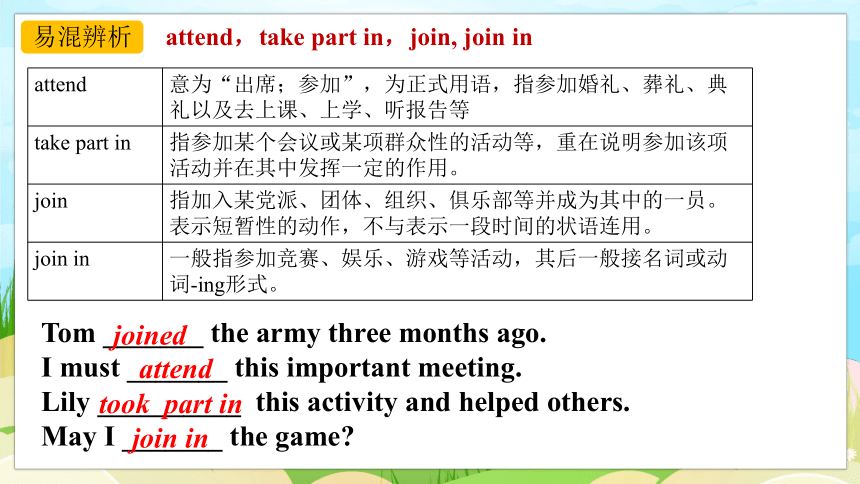

文档简介
(共22张PPT)
Unit 8语法
It must belong to Carla.
Section A 2d&GF~4c
2024-2025学年人教版九年级英语全册 ★★
1
2
Learning Objectives
To learn to use must, might, could and can’t to make inferences.
To talk about belongings.
school T-shirts
hair band
______go to their school
must
____ be a boy
could___ Mei's
might
________
Linda
can't
be
belong to
tennis balls
on the tennis team
_____ be Linda’s
must
Revision
Is this schoolbag really Linda's
1. Where are they
2.How might Linda feel
3. What’s the relationship between them
4. What are they probably talking about
They must be at home. They might be in the living room.
They could be mother and daughter.
They must be talking about the schoolbag.
She might feel worried.
Prediction
1. Why is Linda worried
2. What things are in her schoolbag
3. Where did Linda go yesterday
4. Could her schoolbag be stolen Why
5. Could her schoolbag still be at the park
What will she do next
Books, her hair band and some tennis balls.
She went to the music hall and the park.
Because she can’t find her schoolbag.
Watch the video and answer the questions.
No, it can’t be stolen, because there is not anything valuable in her schoolbag.
Yes. She left early, before the rest of her friends and someone must have picked it up. She will call her friends to check if anybody has it.
① I attended the concert.
It ______be in the music hall.
Where is Linda’s schoolbag
It _____ be stolen.
② There is nothing valuable in it.
It ______ be at the park.
③ I went to the picnic with it.
Somebody _____ have picked it up.
④ I left early, before my friends.
Read the conversation and fill in the blanks.
might
can’t
could
must
Role-play the conversation.
Linda: Mom, I’m really worried.
Mom: Why What’s wrong
Linda: I can’t find my schoolbag.
Mom: Well, where did you last put it
Linda: I can’t remember! I attended a concert yesterday so it might still be
in the music hall.
Mom: Do you have anything valuable in your schoolbag
Linda: No, just my books, my pink hair band and some tennis balls.
Mom: So it can’t be stolen.
Linda: Oh, wait! I went to a picnic after the concert. I remember I had my
schoolbag with me at the picnic.
Mom: So could it still be at the park
Linda: Yes. I left early, before the rest of my friends. I think somebody must
have picked it up. I’ll call them now to check if anybody has it.
adv. 上次; 最近的一次; 最后一次
last 除用于句末外, 还常置于句中。
attend此处用作及物动词,意为“出席;参加”, 其宾语常为concert,meeting等。
adj. “贵重的;很有用的;宝贵的”,在句中可用作定语,也可用作表语。
be valuable to sb.“对某人来说很有价值”
the rest of …意为“剩下的/其余的……”,其后接名词作主语时,谓语动词的单复数形式取决于of后面的名词的单复数。
“must+have+过去分词”的结构,表示对过去时间里可能发生的事情的肯定推测。
anybody是代词,意为“任何人”,常用于否定句和疑问句中,相当于anyone。
attend 意为“出席;参加”,为正式用语,指参加婚礼、葬礼、典礼以及去上课、上学、听报告等
take part in 指参加某个会议或某项群众性的活动等,重在说明参加该项活动并在其中发挥一定的作用。
join 指加入某党派、团体、组织、俱乐部等并成为其中的一员。表示短暂性的动作,不与表示一段时间的状语连用。
join in 一般指参加竞赛、娱乐、游戏等活动,其后一般接名词或动词-ing形式。
易混辨析
attend,take part in,join, join in
Tom _______ the army three months ago.
I must _______ this important meeting.
Lily __________ this activity and helped others.
May I _______ the game
joined
attend
took part in
join in
Whose volleyball is this It must be Carla’s.
She loves volleyball.
Whose hair band is this It could be Mei’s hair band. Or it might belong to Linda. They both have long hair.
What did you see that night I’m not sure, but it can’t be a dog. It was bigger. I think it might be a bear or a wolf.
Read Grammar Focus and underline the modal verbs.
语法重点: 情态动词表推测
表示可能、怀疑、允诺、愿望、义务、必要、猜测等的动词就是情态动词。情态动词可以表示说话人的语气或某种情态,也可以表示推测。
英语中表示推测的情态动词主要有 must, can, could, may, might, can’t等。
must > can > could > may > might >can’t
1. must
must表示可能性最大的肯定推测,意思是“一定、准是”。只能用于肯定句。如果要表示“一定不”,应该用can’t。
eg:He must know the answers. 他肯定知道答案。
2. may / might
may, might表示推测“可能性”时,意思是“可能”,“也许”。might语气更委婉,可能性更小。may, might表推测时,可用于否定句,但不用于疑问句。eg:He may / might not be at home, but I’m not sure.
他可能不在家,不过我也不确定。
3. can / could
can表示推测“可能性”时,一般用于否定句或疑问句。can在疑问句中意思是“会,可能”。
eg:He can’t pick her schoolbag up. 他不可能拿了她的书包。
could 表示某事有可能发生或可能是事实。
eg:Don’t eat it. It could go bad. 不要吃它,可能坏了。
The plane could be put off by the storm.
这趟飞机可能会因为暴风雨而推迟。
Learn to make inference.
程度 肯 否 疑
must ★★★★ √ 一定;肯定/表示有把握的肯定推测
mustn't √ √ 禁止/表示绝对否定
may/might ★★ √ 可能/表示不太有把握的肯定推测
may not/might not ★ √ √ 可能不/表示不太有把握的否定推测
can/could ★★★ √ 可能/表示推测
can’t/couldn't ★ √ √
不可能/表示有把握的否定推测
情态动词
1. She cans play the piano.
2. Tom could is at home.
3. They don’t can speak Japanese.
4. Do we can play basketball after school
Can you find the mistakes in the sentences
Can we can play basketball after school
She can play the piano.
Tom could be at home.
They can’t speak Japanese.
情态动词没有人称、数的变化,即情态动词第三人称单数不加s。
情态动词后面+动词原形。
情态动词和助动词不能一起用。
1. 情态动词不能表示正在发生或已经发生的事情,
只表示期待或估计某事的发生。
2. 情态动词ought和have,后面只能接带to的不定式。
3.情态动词没有人称、数的变化,即情态动词第三人称单数
不加s。
4.情态动词没有非谓语形式,即没有不定式、分词等形式。
语法特征
Choose the best way to complete each sentence using the words in brackets.
1. A: Where’s Jean
B: I’m not sure. She __________ (is / might be/must be) in the laboratory.
2. A: Everyone is going to the pool after school.
B: Really It _________ (must be / can’t be /could be) hot outdoors.
might be
must be
n. 实验室
4a
3. A: That’s the phone.
B: Hmm. I wonder who it ________ (must be / could be / should be).
4. A: I wonder if these are Jim’s glasses.
B: They ________ (can’t be / might be / could be) his. He doesn’t wear glasses.
5. A: I hear water running in the bathroom.
B: It __________ (could be / must be / can’t be) Carla. She was thinking of taking a shower.
could be
can’t be
could be
adv. 在户外;在野外
4b
Complete these responses.
1. A: Many people are wearing coats.
B: The weather must be ________________________.
2. A: Sally has been coughing a lot.
B: She might be ____________________.
3. A: This restaurant is always very crowded.
B: The food ________________.
4. A: Whenever I try to read this book, I feel sleepy.
B: It can’t ____________________.
getting colder/ cold outside
having a sore throat/ ill
must be delicious
be interesting/ exciting
n. 外套
adj. 困倦的;瞌睡的
【妙辨异同】
sleepy
asleep
形容词,意为“困倦的;瞌睡的”。既可作定语,也可作表语。
形容词,意为“睡着的”,只能作表语,不能作定语。fall asleep 意为“入睡”。
What can you see in the picture
What are his/ her hobbies
Why do you think so
Who do you think lives in the room, a boy or a girl
Look at the picture and answer the following questions.
A: It could be a girl’s room because it’s very tidy.
B: I guess so. But it might be a boy’s room because
the clothes look like boys’ clothes.
I.单项选择
1. —Whose T - shirt is this —It ___ be John’s. It’s ____small.
A. can’t; much too B. can’t; too much
C. mustn’t; much too D. mustn’t; too much
2. — Where are you going this month
— We______ go to Xiamen, but we're not sure.
A. needn’t B. must C. might D. mustn’t
3. — Have you decided where to go for your summer vacation
— Not yet. We _____ go to Qingdao. It's a good place for vacation.
A. may B. need C. must D. can
4. — Must I water the flowers now, mum
— No, you ______. You _____ do it later.
A.mustn’t; must B.mustn’t; may C.needn’t; may D.needn’t; must
A
C
A
C
II.用适当的情态动词填空。
1. — Susan has bought a large house with a swimming pool.
— It ______ be very expensive. I never even dream about it.
2. — Listen! Is Mr. Green giving a report in the hall
— No, it ______ be him. He has gone to Japan.
3. Ann hasn’t come to school today. I think she_______________
be ill.
4. The guitar _______________ belong to Alice. She likes playing
the guitar.
5. — I wonder if this is Jack’s book.
— It ______ be his. It has Linda’s name on it.
must
can’t
may/might/could
may/might/could
can’t
1. Recite Grammar Focus and review the usage of can’t be, may/ might/ could be; must be.
2. Finish the exercises in students’ book.
Homework
Unit 8语法
It must belong to Carla.
Section A 2d&GF~4c
2024-2025学年人教版九年级英语全册 ★★
1
2
Learning Objectives
To learn to use must, might, could and can’t to make inferences.
To talk about belongings.
school T-shirts
hair band
______go to their school
must
____ be a boy
could___ Mei's
might
________
Linda
can't
be
belong to
tennis balls
on the tennis team
_____ be Linda’s
must
Revision
Is this schoolbag really Linda's
1. Where are they
2.How might Linda feel
3. What’s the relationship between them
4. What are they probably talking about
They must be at home. They might be in the living room.
They could be mother and daughter.
They must be talking about the schoolbag.
She might feel worried.
Prediction
1. Why is Linda worried
2. What things are in her schoolbag
3. Where did Linda go yesterday
4. Could her schoolbag be stolen Why
5. Could her schoolbag still be at the park
What will she do next
Books, her hair band and some tennis balls.
She went to the music hall and the park.
Because she can’t find her schoolbag.
Watch the video and answer the questions.
No, it can’t be stolen, because there is not anything valuable in her schoolbag.
Yes. She left early, before the rest of her friends and someone must have picked it up. She will call her friends to check if anybody has it.
① I attended the concert.
It ______be in the music hall.
Where is Linda’s schoolbag
It _____ be stolen.
② There is nothing valuable in it.
It ______ be at the park.
③ I went to the picnic with it.
Somebody _____ have picked it up.
④ I left early, before my friends.
Read the conversation and fill in the blanks.
might
can’t
could
must
Role-play the conversation.
Linda: Mom, I’m really worried.
Mom: Why What’s wrong
Linda: I can’t find my schoolbag.
Mom: Well, where did you last put it
Linda: I can’t remember! I attended a concert yesterday so it might still be
in the music hall.
Mom: Do you have anything valuable in your schoolbag
Linda: No, just my books, my pink hair band and some tennis balls.
Mom: So it can’t be stolen.
Linda: Oh, wait! I went to a picnic after the concert. I remember I had my
schoolbag with me at the picnic.
Mom: So could it still be at the park
Linda: Yes. I left early, before the rest of my friends. I think somebody must
have picked it up. I’ll call them now to check if anybody has it.
adv. 上次; 最近的一次; 最后一次
last 除用于句末外, 还常置于句中。
attend此处用作及物动词,意为“出席;参加”, 其宾语常为concert,meeting等。
adj. “贵重的;很有用的;宝贵的”,在句中可用作定语,也可用作表语。
be valuable to sb.“对某人来说很有价值”
the rest of …意为“剩下的/其余的……”,其后接名词作主语时,谓语动词的单复数形式取决于of后面的名词的单复数。
“must+have+过去分词”的结构,表示对过去时间里可能发生的事情的肯定推测。
anybody是代词,意为“任何人”,常用于否定句和疑问句中,相当于anyone。
attend 意为“出席;参加”,为正式用语,指参加婚礼、葬礼、典礼以及去上课、上学、听报告等
take part in 指参加某个会议或某项群众性的活动等,重在说明参加该项活动并在其中发挥一定的作用。
join 指加入某党派、团体、组织、俱乐部等并成为其中的一员。表示短暂性的动作,不与表示一段时间的状语连用。
join in 一般指参加竞赛、娱乐、游戏等活动,其后一般接名词或动词-ing形式。
易混辨析
attend,take part in,join, join in
Tom _______ the army three months ago.
I must _______ this important meeting.
Lily __________ this activity and helped others.
May I _______ the game
joined
attend
took part in
join in
Whose volleyball is this It must be Carla’s.
She loves volleyball.
Whose hair band is this It could be Mei’s hair band. Or it might belong to Linda. They both have long hair.
What did you see that night I’m not sure, but it can’t be a dog. It was bigger. I think it might be a bear or a wolf.
Read Grammar Focus and underline the modal verbs.
语法重点: 情态动词表推测
表示可能、怀疑、允诺、愿望、义务、必要、猜测等的动词就是情态动词。情态动词可以表示说话人的语气或某种情态,也可以表示推测。
英语中表示推测的情态动词主要有 must, can, could, may, might, can’t等。
must > can > could > may > might >can’t
1. must
must表示可能性最大的肯定推测,意思是“一定、准是”。只能用于肯定句。如果要表示“一定不”,应该用can’t。
eg:He must know the answers. 他肯定知道答案。
2. may / might
may, might表示推测“可能性”时,意思是“可能”,“也许”。might语气更委婉,可能性更小。may, might表推测时,可用于否定句,但不用于疑问句。eg:He may / might not be at home, but I’m not sure.
他可能不在家,不过我也不确定。
3. can / could
can表示推测“可能性”时,一般用于否定句或疑问句。can在疑问句中意思是“会,可能”。
eg:He can’t pick her schoolbag up. 他不可能拿了她的书包。
could 表示某事有可能发生或可能是事实。
eg:Don’t eat it. It could go bad. 不要吃它,可能坏了。
The plane could be put off by the storm.
这趟飞机可能会因为暴风雨而推迟。
Learn to make inference.
程度 肯 否 疑
must ★★★★ √ 一定;肯定/表示有把握的肯定推测
mustn't √ √ 禁止/表示绝对否定
may/might ★★ √ 可能/表示不太有把握的肯定推测
may not/might not ★ √ √ 可能不/表示不太有把握的否定推测
can/could ★★★ √ 可能/表示推测
can’t/couldn't ★ √ √
不可能/表示有把握的否定推测
情态动词
1. She cans play the piano.
2. Tom could is at home.
3. They don’t can speak Japanese.
4. Do we can play basketball after school
Can you find the mistakes in the sentences
Can we can play basketball after school
She can play the piano.
Tom could be at home.
They can’t speak Japanese.
情态动词没有人称、数的变化,即情态动词第三人称单数不加s。
情态动词后面+动词原形。
情态动词和助动词不能一起用。
1. 情态动词不能表示正在发生或已经发生的事情,
只表示期待或估计某事的发生。
2. 情态动词ought和have,后面只能接带to的不定式。
3.情态动词没有人称、数的变化,即情态动词第三人称单数
不加s。
4.情态动词没有非谓语形式,即没有不定式、分词等形式。
语法特征
Choose the best way to complete each sentence using the words in brackets.
1. A: Where’s Jean
B: I’m not sure. She __________ (is / might be/must be) in the laboratory.
2. A: Everyone is going to the pool after school.
B: Really It _________ (must be / can’t be /could be) hot outdoors.
might be
must be
n. 实验室
4a
3. A: That’s the phone.
B: Hmm. I wonder who it ________ (must be / could be / should be).
4. A: I wonder if these are Jim’s glasses.
B: They ________ (can’t be / might be / could be) his. He doesn’t wear glasses.
5. A: I hear water running in the bathroom.
B: It __________ (could be / must be / can’t be) Carla. She was thinking of taking a shower.
could be
can’t be
could be
adv. 在户外;在野外
4b
Complete these responses.
1. A: Many people are wearing coats.
B: The weather must be ________________________.
2. A: Sally has been coughing a lot.
B: She might be ____________________.
3. A: This restaurant is always very crowded.
B: The food ________________.
4. A: Whenever I try to read this book, I feel sleepy.
B: It can’t ____________________.
getting colder/ cold outside
having a sore throat/ ill
must be delicious
be interesting/ exciting
n. 外套
adj. 困倦的;瞌睡的
【妙辨异同】
sleepy
asleep
形容词,意为“困倦的;瞌睡的”。既可作定语,也可作表语。
形容词,意为“睡着的”,只能作表语,不能作定语。fall asleep 意为“入睡”。
What can you see in the picture
What are his/ her hobbies
Why do you think so
Who do you think lives in the room, a boy or a girl
Look at the picture and answer the following questions.
A: It could be a girl’s room because it’s very tidy.
B: I guess so. But it might be a boy’s room because
the clothes look like boys’ clothes.
I.单项选择
1. —Whose T - shirt is this —It ___ be John’s. It’s ____small.
A. can’t; much too B. can’t; too much
C. mustn’t; much too D. mustn’t; too much
2. — Where are you going this month
— We______ go to Xiamen, but we're not sure.
A. needn’t B. must C. might D. mustn’t
3. — Have you decided where to go for your summer vacation
— Not yet. We _____ go to Qingdao. It's a good place for vacation.
A. may B. need C. must D. can
4. — Must I water the flowers now, mum
— No, you ______. You _____ do it later.
A.mustn’t; must B.mustn’t; may C.needn’t; may D.needn’t; must
A
C
A
C
II.用适当的情态动词填空。
1. — Susan has bought a large house with a swimming pool.
— It ______ be very expensive. I never even dream about it.
2. — Listen! Is Mr. Green giving a report in the hall
— No, it ______ be him. He has gone to Japan.
3. Ann hasn’t come to school today. I think she_______________
be ill.
4. The guitar _______________ belong to Alice. She likes playing
the guitar.
5. — I wonder if this is Jack’s book.
— It ______ be his. It has Linda’s name on it.
must
can’t
may/might/could
may/might/could
can’t
1. Recite Grammar Focus and review the usage of can’t be, may/ might/ could be; must be.
2. Finish the exercises in students’ book.
Homework
同课章节目录
- Unit 1 How can we become good learners.
- Section A
- Section B
- Unit 2 I think that mooncakes are delicious!
- Section A
- Section B
- Unit 3 Could you please tell me where the restroom
- Section A
- Section B
- Unit 4 I used to be afraid of the dark.
- Section A
- Section B
- Unit 5 What are the shirts made of?
- Section A
- Section B
- Review of Units 1-5
- Unit 6 When was it invented?
- Section A
- Section B
- Unit 7 Teenagers should be allowed to choose their
- Section A
- Section B
- Unit 8 It must belong to Carla.
- Section A
- Section B
- Unit 9 I like music that I can dance to.
- Section A
- Section B
- Unit 10 You're supposed to shake hands.
- Section A
- Section B
- Review of Units 6-10
- Unit 11 Sad movies make me cry.
- Section A
- Section B
- Unit 12 Life is full of the unexpected
- Section A
- Section B
- Unit 13 We're trying to save the earth!
- Section A
- Section B
- Unit 14 I remember meeting all of you in Grade 7.
- Section A
- Section B
- Review of Units 11-14
